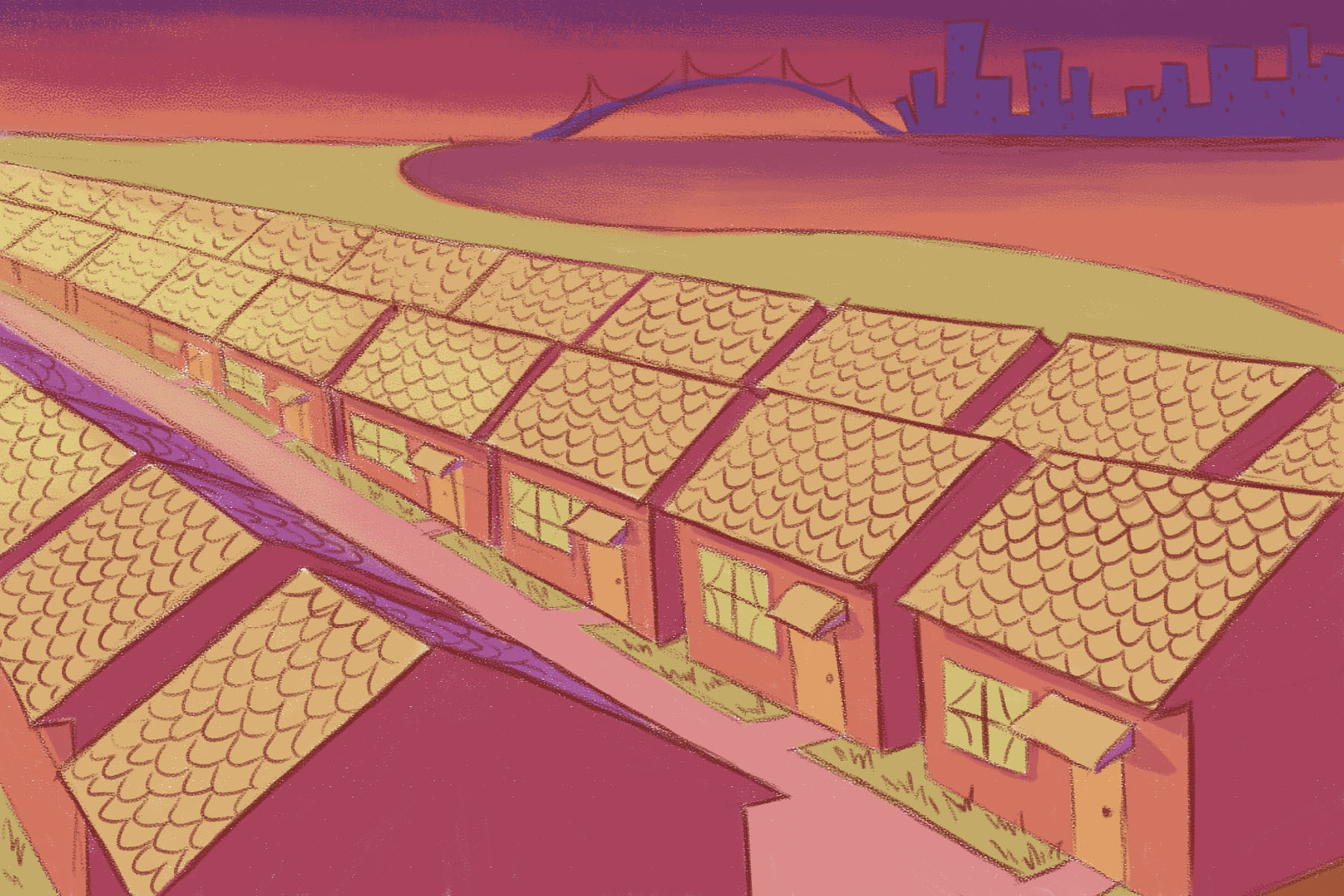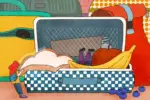There are three senior homes in the town where I’m from, along with a tiny library, two supermarkets, a Starbucks and a competing Dunkin’ Donuts. My afternoons during high school were spent studying in the Starbucks and hanging out in the fields next to the library; these were the only two places within walking distance of each other. If we wanted to venture elsewhere, friends had to chauffeur me around until I could drive my dad’s shoddy Toyota Camry. But even then, without car insurance, I wasn’t allowed to venture far.
When I applied to go to college in New York City, I dreamed of leaving my small, quiet town of Warren for good, planning to only come back on holidays and school breaks. Growing up in suburbia provided reliable comfort within the white picket fence neighborhoods; I know I am privileged to grow up under these circumstances. But despite all that, I could not help but resent how quiet and conservative the sleepy population was in Warren. The number of senior homes in my town is a good indicator of the vibe I grew up around. As a young Asian American creative in a predominantly white town, I often felt out of place.
I recently found an old creative writing assignment I wrote back in my sophomore year that depicts my attitude at the time: “Warren is the epitome of Suburbia. As the second safest town in New Jersey, it is where rich families flock to settle because it’s comfy, expensive as hell, and overtly boring. My parents were part of the lucky immigrants who came to America enough to dump money on tutors in hopes of shaping their kids into child-prodigies.”
I flinch at the bitterness in those words when I read them now. I was frustrated, creatively parched, bored and trapped in Warren. I believed that if I worked hard enough, I could escape this place that had nothing for me. College was my exit ticket.
From that same piece, I wrote: “And because of this, I place the City, the antithesis of Suburbia, on a pedestal. I want the grime, the bustle, the constant hubbub of unfiltered life that flows out of cities, the opposite of the superficial orderliness of Warren. As I work into late nights, with the electronic light of my computer washing my face in the glare of 2 a.m. busywork, I keep this dream in the back of my mind.”
My borderline-workaholic lifestyle paid off and in December 2018, I was accepted into the school of my dreams. Unfortunately, in the nine months leading up to my college move-in date, my fantasy of living in the City had transformed from a dream that motivated me to work hard, into an all-consuming anticipation.
Not only was it a waiting game for the “best four years of my life” to begin, but I had gotten what I wanted. I was just waiting, loitering, almost flunking out of my classes until I could escape Warren. Waiting was painful, but my dreams about dorm life, new friends, freedom, subways, nightlife, art museums and eccentric people kept me afloat.
I would call my first semester some sort of contained hot mess. All my memories of those first few months have a sort of vibrating halo around them; they were a shimmering mood of excitement, but also anxiety as I scrambled to adjust. Attending my first big lectures, going to Koronet’s Pizzeria at 3 A.M., running in Central Park, figuring out the subway system, getting my ears pierced with one of my closest friends are a few of my fondest memories. It was new experience after new experience.
The thing that struck me most about the city can be summarized by something a wise upperclassmen friend told me: “Living in the city is living with constant F.O.M.O.” F.O.M.O standing for “Fear Of Missing Out.” Whereas Warren had nothing to offer me, the city had everything to offer. In fact, it had so much that I felt like I was drowning in opportunity — missing too many of them, and paralyzed by constantly having to choose.
No matter how time-efficient I was, no matter how diligently I time-blocked, I’d always see on social media the events I passed up, and a sense of remorse would come over me. I knew New York City was fast-paced, and that’s what drew me to it in the first place. The freedom of choice is what I signed up for, longed for, but by winter break, I was thoroughly burnt out.
Three months of trying to “do it all” gave me a lot to process when I came home. I was determined to parcel out my time during the second semester more efficiently and prevent F.O.M.O from taking up any mental space. My roommate and I started going to yoga twice a week starting in February. We celebrated our birthdays together. We stopped going to trashy frat parties, and instead opted for discovering the underground art communities around us. We actively chose to stay in on weekends occasionally and just watch movies. As I finally started to find my footing, corona hit.
Quarantine.
After only six months of college, I was back to where I started. Square one: Warren.
A few weeks into quarantine, I noticed my room becoming as messy as it used to be in high school. I took my belongings out of my college storage bins, but refused to put them in my bedroom closet because that would mean my stay was becoming permanent.
The night after Columbia declared that we weren’t going back, I laid in my childhood bed feeling small. It felt like I had been thrown into a time machine, trapped at home indefinitely, my high school mindset creeping back in.
My demonization of suburbia fueled me through high school, often at the expense of my happiness, but it got me into the college of my dreams. While my quarantine anxieties about feeling stuck are valid, they remind me of how I felt about my hometown in high school. Except, this time, I can’t work hard and escape. I am overwhelmed by this feeling of being stuck at home, stuck in Warren, stuck in suburbia. And there’s nothing I can do about nothing — nothing that will make this pandemic go away.
Days blur together. Weekends don’t feel any different from weekdays; I miss JJs all-day breakfast, my college friends, my dorm room 407. I even miss Butler Library. I simply miss being surrounded by people. I FaceTime my college friends and ask them if anything is new, knowing that nothing is.
Sometimes I get stuck in that mindset of feeling trapped, and it’s easy for me to blame it on my location and surroundings. I know rationally, it wouldn’t matter where I was during this global pandemic — though America seems to be handling it exceptionally badly — I would still feel trapped. As I process my conflicted feelings toward being back in Warren, I reconcile with my resentment toward Suburbia.
In the past few weeks, I’ve hung out, socially distanced, with a few friends, exploring the parks and trails around us that I was too busy to enjoy during high school. One of my favorite places to walk with my friends is the Raritan Canal. Next to flowing water and lined with overhanging greenery, the canal is a straight path.
We usually walk two or three miles one way then turn around and retrace our steps. There’s something ironic in ending our walks where we started, much like returning home for an extended stay after an abruptly shortened freshman year. Rediscovering these hidden green spots around my childhood home makes me appreciate suburbia in a way I previously overlooked.
Grocery shopping with my mom is another activity I’ve started looking forward to. Since my mom works at a hospital, I don’t see her much during the week. I feel a sense of childish nostalgia pushing the cart behind my mom at Costco, chatting routinely while surrounded by enormous quantities of food. Sometimes, after we check out and we’re going back to the car, I’ll take a running start and step up onto the rattling shopping cart, cruising toward our car and she’ll yell at me like she used to when I was 10 years old.
I often go and drive around just to get out of my house, something I’ve missed while living in the city. I am one of those notoriously terrible New Jersey drivers, but the highways have recently been sparsely populated; one of my favorite views is taking Route 287 at sunset. In those moments, I know that deep down, I don’t hate Suburbia as much as I convinced myself that I did. There is peace and solitude here if you don’t let boredom infiltrate your state of mind.
I know I had moments like these back in high school too, because even through my bitterness, I wrote in that aforementioned piece: “Brandon picks me up every morning in his Acura, because I don’t have my own car and I refuse to take the bus that smells like JUUL. We drive on the highway to school, and in my half-awake state, the sunrise is always pink, floating above the lanes of sparse traffic at 7:12am. No matter how tired I am, no matter how bad Brandon’s road rage is, we always have a moment where we watch the peachy clouds sit on the highway before reaching school.”
It is a weird feeling to be rooted in a place that I used to feel trapped in. Suburbia was never really the issue that made me resent my situation; in the end, I have the choice to make the most of my current circumstances. There are benefits of being home.

















